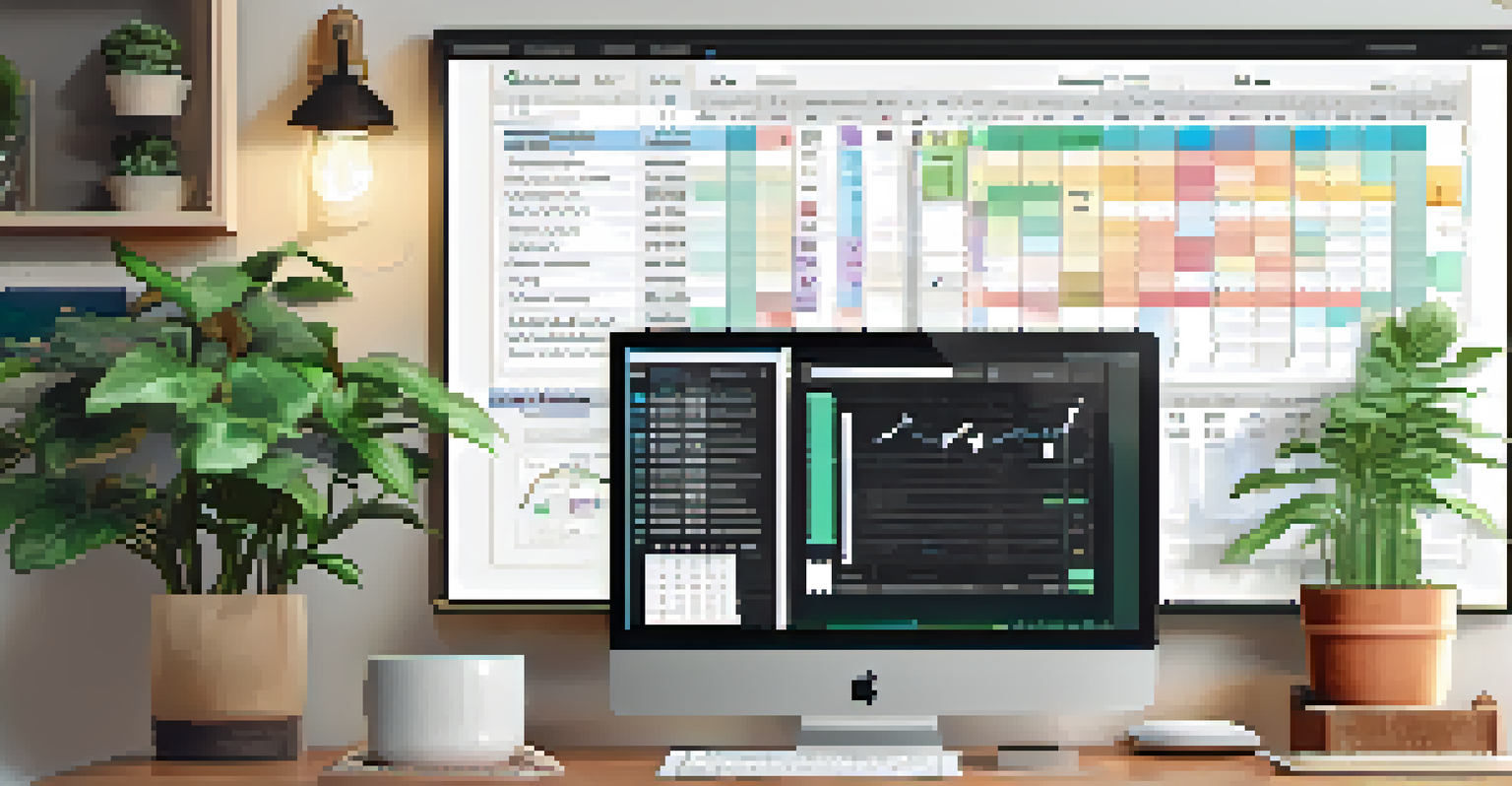Evaluating Property Cash Flow: Essential Strategies

Understanding Property Cash Flow Basics
Property cash flow refers to the net income generated from a rental property after all expenses are deducted. It's essential to grasp this concept as it directly impacts your investment's profitability. Essentially, a positive cash flow indicates that your property is earning more than it costs to maintain.
In investing, what is comfortable is rarely profitable.
To calculate your cash flow, you'll want to start with your rental income and subtract operating costs such as property management fees, maintenance, taxes, and mortgage payments. This straightforward formula can help you determine whether your property is a good investment or if adjustments are needed.
Remember, cash flow isn't just about covering expenses; it's also about generating a return on your investment. A healthy cash flow can provide you with the financial flexibility to reinvest in your property or expand your real estate portfolio.
Identifying Key Cash Flow Metrics
When evaluating property cash flow, several metrics can help you gauge performance. Key indicators include cash-on-cash return, cap rate, and gross rental yield, each providing unique insights into your investment's financial health. Understanding these metrics will empower you to make informed decisions regarding your property investments.

For instance, cash-on-cash return measures the annual pre-tax cash flow relative to the total cash invested. This metric can help you assess how effectively your investment is generating income compared to other opportunities. Meanwhile, the cap rate offers a quick snapshot of your property's value relative to its income, making it easier to compare different investments.
Understanding Cash Flow Basics
Property cash flow is the net income from rental properties after expenses, crucial for investment profitability.
By regularly analyzing these metrics, you can spot trends and make adjustments as needed to optimize your cash flow. This proactive approach will not only enhance your current investments but also set you up for long-term success in real estate.
Calculating Operating Expenses Accurately
Accurate calculations of operating expenses are crucial for a clear picture of your cash flow. These expenses can include property taxes, insurance, maintenance costs, and utilities, among others. Overlooking any costs can lead to an inflated view of your cash flow, potentially jeopardizing your investment strategy.
The best investment on Earth is earth.
To ensure accuracy, consider keeping a detailed spreadsheet or using property management software that tracks all expenses. This level of detail allows you to review your spending habits and identify areas where you can cut costs or improve efficiency. Regularly revisiting these calculations can lead to a more realistic assessment of your property's financial performance.
Additionally, don't forget about unexpected expenses, like emergency repairs or tenant turnover costs. Allocating a portion of your income for these surprises can help you maintain a positive cash flow even when challenges arise.
Maximizing Rental Income Potential
Maximizing your rental income is a fundamental strategy to enhance your property cash flow. This can involve adjusting rental rates, improving property features, or even increasing occupancy rates through effective marketing. A well-researched approach can lead to higher returns without necessarily increasing your expenses.
Consider conducting a market analysis to ensure your rental rates are competitive. This might involve examining similar properties in your area and their rental prices. You may find that minor upgrades, like fresh paint or modern appliances, can justify a higher rent, attracting more tenants and increasing your cash flow.
Key Metrics for Cash Flow Success
Metrics like cash-on-cash return and cap rate provide insights into your investment's financial health.
Moreover, building strong relationships with your tenants can lead to longer lease terms and fewer vacancies. Happy tenants are more likely to renew their leases, providing you with stable, predictable cash flow.
Evaluating Financing Options for Properties
The financing option you choose can significantly impact your property cash flow. Whether you opt for a traditional mortgage, a hard money loan, or even seller financing, each comes with its benefits and challenges. Carefully assessing these options is essential for maintaining healthy cash flow.
For example, a lower interest rate on a mortgage can lead to reduced monthly payments, directly enhancing your cash flow. Alternatively, opting for a longer loan term might lower your payments but could result in paying more interest over time. Weighing these factors will help you select the financing that best supports your cash flow goals.
Always consider your investment strategy and how it aligns with different financing methods. A well-thought-out financing plan can give you the flexibility to invest in more properties, ultimately increasing your overall cash flow.
Contingency Planning for Cash Flow Stability
Contingency planning is crucial for ensuring cash flow stability, especially when unexpected challenges arise. This could involve setting aside a reserve fund to cover potential emergencies, such as significant repairs or tenant vacancies. Preparing for the unexpected can help you maintain a positive cash flow, even during downturns.
Consider creating a budget that allocates a specific percentage of your rental income to this reserve fund. This practice can safeguard your cash flow against unforeseen expenses, helping you avoid the panic that often accompanies financial surprises. Additionally, regularly reviewing your budget can ensure that your reserve fund remains adequate.
Importance of Contingency Planning
Setting aside a reserve fund and diversifying your portfolio are essential for maintaining stable cash flow during unexpected challenges.
Moreover, diversifying your property portfolio can also serve as a contingency plan. By investing in different types of properties or locations, you can mitigate risks associated with market fluctuations, ensuring steadier cash flow over time.
Regularly Monitoring and Adjusting Strategies
Regular monitoring of your property cash flow is essential for long-term success. This means not only reviewing your income and expenses but also analyzing market trends and tenant feedback. By staying engaged with your property's performance, you can make timely adjustments that enhance your cash flow.
Utilize financial reports and tools that allow you to track your cash flow over time. This data can help you identify patterns or issues that may need addressing. For example, if you notice a dip in rental income during certain months, you can explore strategies to attract tenants during those periods.

Additionally, be open to adjusting your strategies based on your findings. Whether it’s raising rents, improving property features, or even changing property management companies, being adaptable can significantly improve your cash flow and overall investment performance.